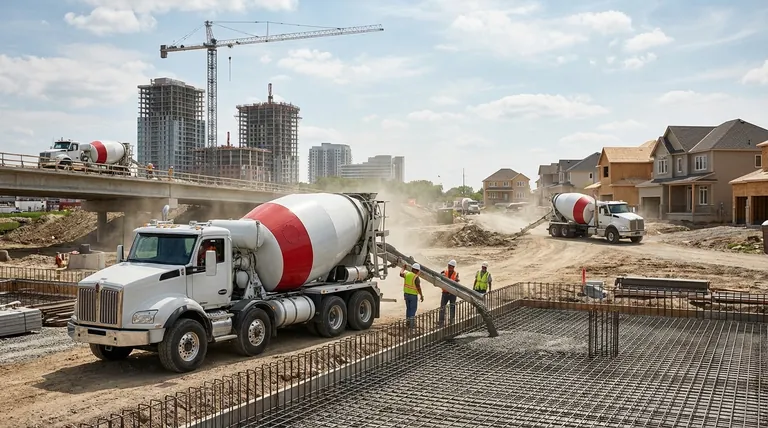In short, concrete mixer trucks are used for nearly any construction project that requires a significant volume of professionally mixed concrete. This ranges from massive infrastructure like bridges and highways to large commercial buildings and common residential projects such as foundations, driveways, and patios.
The core decision to use a concrete mixer truck is driven by scale and the need for consistency. When a project demands more concrete than can be practically mixed on-site by hand, a mixer truck becomes the essential tool for efficiency, quality control, and meeting project deadlines.

The Core Function of a Mixer Truck
A concrete mixer truck isn't just a delivery vehicle; it's a mobile mixing plant. Its primary purpose is to ensure a continuous supply of homogenous, high-quality concrete is available exactly when and where it's needed for pouring.
Ensuring Quality and Consistency
The most critical advantage is the elimination of manual mixing errors. A plant-batched mix delivered by truck guarantees that the ratios of cement, sand, gravel, and water are precise and consistent, which is vital for achieving the specified structural strength.
Maximizing On-Site Efficiency
Using a mixer truck dramatically increases productivity. It removes the labor-intensive and time-consuming process of mixing concrete on-site, allowing crews to focus entirely on placement and finishing, which helps maintain tight project timelines.
Key Applications by Project Scale
The versatility of concrete mixer trucks allows them to serve a wide spectrum of construction needs, categorized primarily by the volume of concrete required.
Large-Scale Infrastructure and Commercial Projects
For projects like high-rise buildings, bridges, tunnels, and highways, mixer trucks are non-negotiable. The sheer volume of concrete needed and the strict structural requirements demand the industrial-scale production and reliable delivery that only a fleet of mixer trucks can provide.
Mid-Sized and Residential Construction
This is the most common application. Projects such as home foundations, driveways, slabs, and patios require a substantial amount of concrete. A mixer truck is the standard choice here, providing a far more efficient and reliable solution than mixing dozens or hundreds of individual bags by hand.
Specialized and Remote Projects
Some projects, like remote high-speed railways or township-level highways, benefit from specialized self-loading concrete mixers. These vehicles can load their own raw materials, mix the concrete on-site, and then pour, offering unique flexibility in locations far from a central batching plant.
Understanding the Trade-offs
While incredibly useful, a mixer truck is not the right tool for every single job. The decision to use one hinges on a clear cost-benefit analysis.
When a Mixer Truck is Overkill
For very small tasks, ordering a truck is impractical. Jobs like setting a few fence posts, performing minor concrete repairs, or pouring a small countertop are better suited for a portable electric mixer or even mixing by hand in a wheelbarrow.
The Cost-Benefit Analysis
Using a mixer truck introduces delivery and minimum-volume costs. However, it significantly reduces on-site labor costs and material waste. For any project requiring more than a cubic yard of concrete, the efficiency gains and guaranteed quality almost always outweigh the truck's expense.
Making the Right Choice for Your Goal
Ultimately, the type of project dictates the best method for sourcing concrete. Your decision should be guided by volume, quality requirements, and budget.
- If your primary focus is a large-scale project requiring structural integrity: A concrete mixer truck from a batch plant is the only viable option to ensure quality and volume.
- If your primary focus is a mid-sized residential project like a foundation or driveway: A standard mixer truck offers the ideal balance of efficiency, cost-effectiveness, and consistent quality.
- If your primary focus is a minor repair or a single-post installation: Mixing concrete manually on-site is the most practical and economical approach.
Choosing the right concrete solution is the first step toward ensuring your project is built on a solid foundation.
Summary Table:
| Project Type | Typical Use Case | Why a Mixer Truck is Ideal |
|---|---|---|
| Large-Scale Infrastructure | Highways, bridges, high-rise buildings | Guarantees massive volume and structural consistency |
| Commercial & Residential | Home foundations, driveways, slabs | Provides efficiency and quality for mid-sized projects |
| Specialized/Remote Projects | Remote railways, township roads | Self-loading mixers offer flexibility away from plants |
| Small-Scale Jobs | Fence posts, minor repairs | Often impractical; manual mixing is more cost-effective |
Ready to Ensure Your Project's Foundation is Solid?
Whether you're building a highway, a commercial complex, or a residential driveway, having the right equipment is critical for success. GARLWAY specializes in providing robust and reliable construction machinery, including concrete mixer trucks, to help construction companies and contractors deliver projects on time and to specification.
Partner with GARLWAY to benefit from:
- Enhanced Efficiency: Reduce on-site labor and minimize project timelines.
- Guaranteed Quality: Ensure consistent, high-strength concrete mixes for superior structural integrity.
- Expert Support: Get tailored solutions for your specific project scale and requirements.
Let's build something great together. Contact our experts today to discuss the perfect concrete solution for your next project!
Visual Guide

Related Products
- Construction Products Concrete Plant Machine Mixing Concrete Mixer
- JDC350 Small Cement Concrete Mortar Mixer
- HZS90 Large Multiquip Concrete Mixers for Construction
- JW1000 Mobile Cement Mixer Concrete Mixer Truck and Batching Plant
- Commercial Construction Mixer Machine for Soil Cement Mixing Concrete
People Also Ask
- What are the factors influencing choice of a concrete mixing plant? Key Considerations for Efficiency
- What are the 4 classifications of concrete mix? Choose the Right Mix for Your Project's Success
- What are the disadvantages of ready mixed concrete? Navigate Logistical & Cost Risks
- How does concrete not harden in a truck? The Role of Continuous Agitation Explained
- Is there a difference between a concrete mixer and a mortar mixer? Choose the Right Machine for Your Project



















